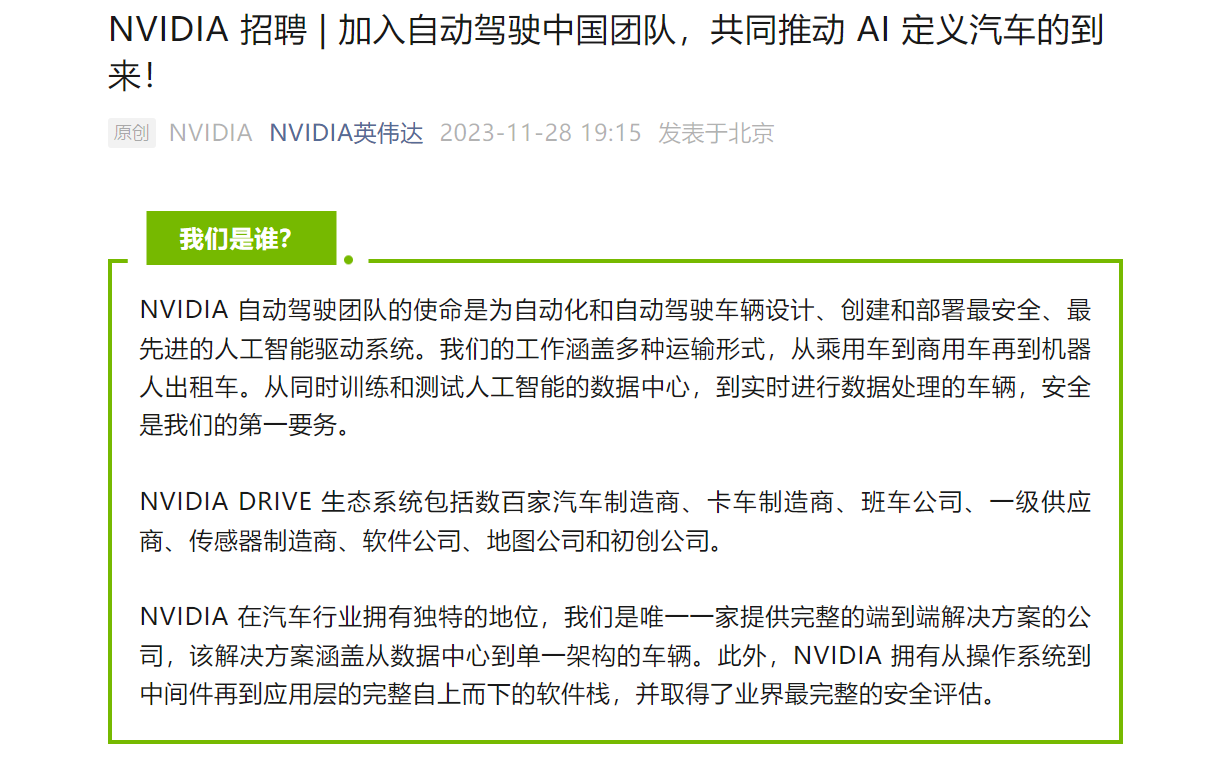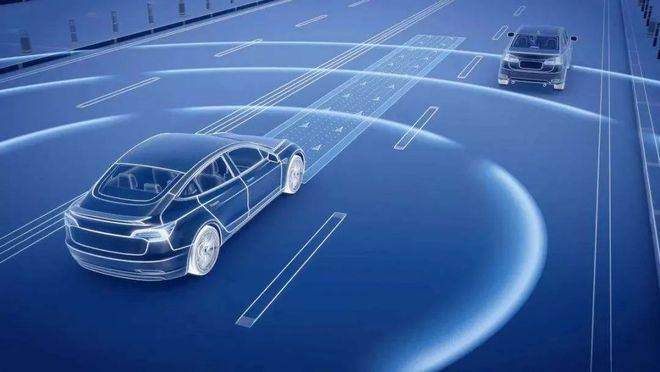Nvidia Recruiting Self-driving Talents in China Wu Xinzhou, Former Senior Executive of Xiaopeng, as Team Leader
On the evening of November 28, Nvidia's official WeChat official account announced that the company was recruiting new talents for its automated driving teams in Beijing, Shanghai and Shenzhen. The leader of NVIDIA's autonomous driving team is Wu Xinzhou, former Vice President of Autonomous Driving at Xiaopeng.
On the evening of November 28, Nvidia's official WeChat official account announced that the company was recruiting new talents for its automated driving teams in Beijing, Shanghai and Shenzhen.

Nvidia has currently opened up to 25 positions for multiple teams, including the autonomous driving software group, autonomous driving platform group, system integration&testing group, map&simulation group, and product group.
It is worth noting that the person in charge of the aforementioned autonomous driving team is Wu Xinzhou, former Vice President of Autonomous Driving at Xiaopeng. When Wu Xinzhou left Xiaopeng, there were rumors that he would join NVIDIA and may hold the position of "Global Vice President". Subsequently, Wu Xinzhou also confirmed the news of joining NVIDIA. However, according to the latest recruitment article on Nvidia's official official account, Wu Xinzhou does not have the rumored title of "global vice president".
According to Wu Xinzhou's LinkedIn information, he joined NVIDIA as the head of the automotive business, responsible for overall strategy, product planning, and engineering execution of the automotive business. His goal is to collaborate with automotive original equipment manufacturers and utilize in vehicle and cloud artificial intelligence technology to achieve autonomous driving in mass-produced vehicles worldwide. It is reported that Wu Xinzhou reports directly to Huang Renxun, the CEO of NVIDIA, in his business.
Although Nvidia is a chip manufacturer, it enjoys a crucial position in the field of autonomous driving with its powerful chips. Last September, the company launched the latest generation of automotive grade chip Thor, which can achieve 2000 floating-point operations per second (teraflops).
The recruitment of multiple talents by Nvidia in China indicates that Nvidia is considering China as an important research and development center for its autonomous driving business. The market is not surprised by this, as the fierce competition in the Chinese automotive industry has prompted many electric vehicle manufacturers to invest in autonomous driving, which has also cultivated a group of experienced talents in technology from research and development to large-scale production.
In fact, Wu Xinzhou mentioned the key role played by China in promoting the company's commercial success in the field of intelligent driving. He wrote in a recruitment article, "China has the most suitable soil for the implementation of high-level autonomous driving technology, and has also cultivated the world's top autonomous driving production talents. He hopes that the Chinese autonomous driving team can become the core force in promoting NVIDIA's productization of autonomous driving in technology and product polishing, and work together with talents and experience from the Chinese region to create global autonomous driving products."

According to the official introduction of Nvidia, the company's automated driving team, led by Wu Xinzhou, will carry out a number of work to "design, create and deploy" artificial intelligence systems for automated and autonomous vehicle. And it is stated that these works will cover various forms of transportation, from passenger cars to commercial vehicles and then to robotic taxis. In addition, the NVIDIA DRIVE ecosystem includes hundreds of car manufacturers, truck manufacturers, shuttle bus companies, first tier suppliers, sensor manufacturers, software companies, map companies, and startups.
NVIDIA officials also stated that the company has a unique position in the automotive industry as it is the only company to provide a complete end-to-end solution that covers vehicles from data centers to a single architecture. In addition, Nvidia has a complete top-down software stack from the operating system to middleware and application layer, and has obtained the most comprehensive security assessment in the industry.
Nvidia has long been involved in the development of autonomous vehicle technology, providing the industry with CPUs that can perform millions of calculations simultaneously. It is worth noting that although Nvidia's chip trading with Chinese companies is currently restricted under US export controls, its automotive products are not currently affected.
·Original
Disclaimer: The views in this article are from the original Creator and do not represent the views or position of Hawk Insight. The content of the article is for reference, communication and learning only, and does not constitute investment advice. If it involves copyright issues, please contact us for deletion.